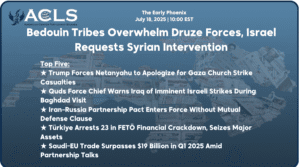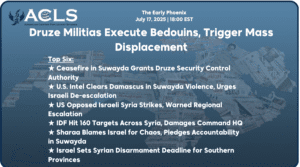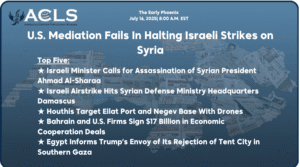Biden Seeks to Prevent Rafah Operation
TOP HEADLINES:
- Biden Rules Out Israeli Operation in Rafah, Urges Targeted Approach
- Israeli Delegation Heads to Qatar for Gaza Ceasefire Negotiations
- Iran to Invest Over $13 Billion in Development of Joint Oil Fields with Iraq
- Kurdistan Democratic Party Decides to Boycott Elections
- Israel Wary of Russia’s Military Expansion in Southern Syria
=======================
★ ISRAEL & PALESTINIAN TERRITORIES
Biden Rules Out Israeli Operation in Rafah, Urges Targeted Approach
In a significant policy shift, US President Joe Biden expressed opposition to a major Israeli ground offensive in Rafah during a conversation with Prime Minister Benjamin Netanyahu on 18 March. Biden pressed Netanyahu for a more targeted strategy to avoid civilian casualties and worsening the humanitarian situation. This call, marking their first discussion since February 15, underscored concerns about the operation’s potential to deepen Gaza’s anarchy and isolate Israel globally. The discussion follows Senate Majority Leader Chuck Schumer’s critique of Netanyahu’s leadership and his call for early Israeli elections, a stance that has stirred tensions between the US and Israel.
Israeli Delegation Heads to Qatar for Gaza Ceasefire Negotiations
An Israeli negotiation team, led by Mossad Chief David Barnea, is heading to Qatar today to discuss a ceasefire and prisoner exchange with Hamas. The Israeli cabinet has granted the team broad, though limited, negotiation powers. Hamas has presented 13 new demands for the deal, which include the release of around 800 Palestinian prisoners in exchange for 40 Israeli hostages. The potential agreement also involves a 6-week ceasefire in Gaza, with further conditions for withdrawal of Israeli forces and easing of the blockade for reconstruction efforts. This round of talks could last up to two weeks.
Ben-Gvir and Smotrich Threaten to Leave Government Over Potential Hostage Deal with Hamas
Israeli National Security Minister Itamar Ben-Gvir and Finance Minister Bezalel Smotrich have threatened to withdraw from PM Netanyahu’s government if a potential deal with Hamas includes the release of Palestinian prisoners convicted of killing Israelis. Their declaration comes as an Israeli delegation heads to Qatar for negotiations on a prisoner exchange plan. Despite wide support within Israeli circles for the emerging deal, Ben-Gvir and Smotrich’s stance represents a significant potential political rift. The Israeli Cabinet has authorized the delegation, led by the Mossad chief, to negotiate the deal, which remains a contentious issue due to Hamas’s demands for guarantees from international actors.
EU Will Sanction Hamas Members and, for the First Time, Israeli Settlers
European Union foreign ministers have reached a preliminary agreement to impose sanctions on Israeli settlers committing violence against Palestinians in the West Bank and to intensify sanctions on Hamas members. This marks the first time the EU, consisting of 27 member states, has agreed to sanction Israeli settlers for violence, aligning with actions previously taken by the United States and Britain.
=======================
★ IRAN
Iran to Invest Over $13 Billion in Development of Joint Oil Fields with Iraq
Iran announces plans to develop six Iraqi oil fields, dubbed “joint fields,” with investments exceeding $13 billion. These developments are part of a significant initiative, highlighted by the attendance of Iran’s First Vice President, Mohammad Mokhber, and Oil Minister, Javad Owji, at the contract signings. Owji noted these contracts aim to boost production by 400,000 barrels per day, generating $15 billion for Iran and creating 66,000 jobs. Owji said that despite outside pressure, Iran maintains steady oil exports, having completed nearly 130 projects worth $28.5 billion and launched 50 new projects, marking a significant milestone in its oil industry.
=======================
★ LEBANON
UNSG Guterres Says Hizballah’s Arms in Southern Lebanon are “Unauthorized”
The UN Security Council is set to discuss a report prepared by Secretary-General António Guterres regarding Resolution 1701 during escalating tensions across the “Blue Line” in Southern Lebanon. Guterres expressed “grave concern” over continuous hostilities and called for a political process to address the root causes of conflict, emphasizing the need for full implementation of Resolution 1701. He highlighted serious concerns about unauthorized arms possession in areas south of the Litani River, specifically naming Hizballah and other non-state armed groups. Guterres also condemned Israeli violations of Lebanese sovereignty, urging an end to overflights above Lebanese territory.
=======================
★ YEMEN
U.S. Commander Says Yemen Poses Biggest Challenge to U.S. Navy Since World War II
U.S. vessels in the Red Sea are engaged in a serious battle against attacks from Yemen against not just commercial ships but also the U.S. naval group assigned for their protection. U.S. Navy Captain Dave Wroe, commanding four destroyers patrolling the Red Sea region, described facing diverse threats from ballistic missiles, cruise missiles, drones, and both surface and underwater unmanned vessels loaded with explosives. He judged that Yemen presents the most significant challenge to the U.S. Navy since World War II, requiring more than just military tools for resolution, pointing towards the necessity of broader government and international efforts.
UN Security Council Demands Houthi Cease Red Sea Attacks
The UN Security Council has unanimously condemned the Houthi attacks on commercial ships in the Red Sea, including the incidents involving MV True Confidence and MV Rubymar, which resulted in tragic casualties and a sunken vessel, posing a navigational hazard. The council stressed the importance of fully implementing Resolution 2216 to prevent arms access to the Houthis and emphasized the critical role of the Red Sea route for humanitarian efforts and local livelihoods. Members called for an immediate halt to Houthi attacks in accordance with international law and reaffirmed their support for UN verification and inspection mechanisms to maintain regional security and stability.
=======================
★ IRAQ
Kurdistan Democratic Party Decides to Boycott Elections, Signaling Deepening Crisis
Responding to a series of Iraqi federal court rulings that threaten the existence of the Kurdistan Regional Government as a constitutional component of Iraq, the Kurdistan Democratic Party has decided not to participate in elections for the KRG parliament scheduled for June. The KDP specifically criticized the federal court’s recent amendments to the election law as unconstitutional, particularly the court’s decision to change the KRG’s electoral districts and to discard minority quotes for parliamentary seats. The political dispute is the latest setback for relations between the KRG and the federal government in Baghdad. KDP leaders say the Iraqi federal court has no constitutional standing, since the Iraqi parliament has never issued the law the constitution requires to define the court’s role, and consequently the court has become an instrument for pro-Iranian political influence in the country. The KDP noted that the federal court appears to be intent on collapsing the KRG as a constitutional entity and on tilting the electoral playing field against the KDP within Kurdistan. U.S. government spokesmen, meanwhile, on Monday urged all Iraqi parties to remain committed to full participation in transparent elections.
Germany Ready to Sign Military Cooperation Agreement with Iraq
Germany announced its readiness to sign a bilateral security and military cooperation agreement with Iraq. This statement was made during the visit of the German State Minister for Foreign Affairs, Tobias Lindner, to Iraq, where he met Prime Minister Mohammed Shia al-Sudani. Al-Sudani highlighted the stability and security in Iraq and the advancement of its security forces, emphasizing the shift towards bilateral relations with international coalition member states. Germany’s announcement coincides with tense talks between the U.S. and Iraq over the continued presence of the international counter-ISIS coalition in Iraq.
=======================
★ GULF REGION
Blinken to Discuss Gaza Ceasefire in Saudi Arabia and Egypt
U.S. Secretary of State Antony Blinken is set to visit Saudi Arabia and Egypt this week, focusing on efforts to secure a ceasefire in Gaza and increase humanitarian aid delivery to the region. Blinken highlighted the dire humanitarian situation in Gaza, noting that 100% of its population requires aid. Emphasizing the need for Israel to prioritize civilian protection and humanitarian assistance, Blinken’s trip aims to lay the groundwork for a lasting regional peace. This visit follows President Biden’s expression of concern over a potential Israeli ground operation in Rafah and the urgent need for humanitarian relief in Gaza.
=======================
★ EGYPT
World Bank Aid Boosts Egypt’s International Dollar Inflows to Over $50 Billion
The World Bank announced on March 18th its commitment to provide Egypt with over $6 billion in aid, significantly increasing global rescue efforts for Egypt’s struggling economy to over $50 billion in recent weeks. This aid package, aimed at both government support and private sector development, follows the European Union’s $8 billion aid commitment and an IMF funding increase to $8 billion. These financial pledges, totaling $57 billion, aim to address Egypt’s dollar shortage and require comprehensive economic reforms beyond mere financial injections. The World Bank’s support emphasizes private sector growth, efficient public resource management, and enhanced social protection, signaling strong international support for Egypt’s reform efforts.
S&P Upgrades Egypt’s Outlook to Positive, Anticipates Foreign Reserve Boost
Standard & Poor’s has upgraded Egypt’s economic outlook from stable to positive while maintaining its B-/B long and short-term foreign and local currency sovereign credit ratings. This positive shift reflects the potential for an improved external position and alleviation of foreign currency shortages, partly due to the Egyptian pound’s flotation aimed at GDP growth and fiscal consolidation. A rating upgrade could occur with accelerated improvements in Egypt’s public finance or external debt conditions, potentially through increased direct foreign investment or asset privatization. Conversely, a return to a stable outlook might stem from reform retrenchment or unaddressed high government borrowing costs.
=======================
★ SYRIA
Israel Concerned by Russia’s Military Expansion in Southern Syria
Israeli broadcaster Kan reports on Israel’s concern over Russia’s military build-up in southern Syria, near the Syrian-Israeli border. Russia has recently deployed military police patrols and established new positions in collaboration with Assad’s forces mere kilometers from the border. This move is part of a series of Russian military activities following the escalation in Gaza, including the establishment of a joint observation point near the Golan Heights and increased Russian air patrols in southern Syria.
Syrian Opposition Contemplates Appealing to UN Security Council to Break Constitutional Committee Stalemate
The Syrian Negotiation Commission is considering a session with the UN Security Council to address the Syrian issue, should UN Envoy Pedersen fail to persuade the Assad regime to participate in the ninth round of the Constitutional Committee meetings set for April 22. The opposition, facing the regime’s continuous delays, insists on Geneva as the meeting venue after rejecting proposals to move the venue to Riyadh, Nairobi, or Cairo. Despite the deadlock, the opposition still aims for a political transition based on UN Security Council Resolution 2254 and based on UN-brokered talks in Geneva. The Assad regime, meanwhile, has proposed moving the talks to Baghdad, a proposal the opposition considers another tactic by Assad to avoid a political settlement of the war.
=======================
★ TURKIYE
Turkish FM Urges PUK in Iraq to Sever Ties with PKK
Turkish Foreign Minister Hakan Fidan called on the Patriotic Union of Kurdistan (PUK) in Suleymaniyah, Iraq, to dissociate from PKK terrorists, emphasizing the need for the PUK to rectify their cooperation with the group deemed a national security threat by Ankara. During a live broadcast, Fidan expressed Ankara’s desire for renewed friendship and collaboration against the PKK, highlighting the expectation for the PUK to cease support for the PKK and YPG. Fidan’s remarks are part of Türkiye’s broader effort to mobilize regional actions against the PKK, a group responsible for over 40,000 deaths in its long-standing conflict with Türkiye.
=======================
📌 Incase you missed it,
📰 THE EARLY PHOENIX March 14, 2024
🔗 Follow the latest news from the American Center for Levant Studies via Google News



